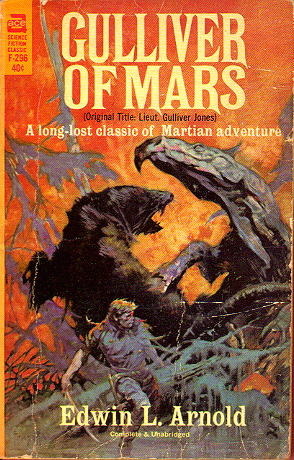Chapter VI — Gulliver of Mars
byChapter VI invites readers into a quiet but profound turning point as the protagonist contemplates his place on a world that dazzles yet alienates him. After the intense spectacle of a magical incident, he is left adrift in a place that seems both dreamlike and indifferent. The grandeur of the Martian palace offers no comfort, only a reminder of what he’s lost. Mars, for all its elegance, feels lifeless without warmth or meaning. The people, beautiful and eternal, seem untouched by emotion. He longs for Earth’s imperfections—the noise, the flaws, the realness.
Haunted by this emptiness, he seeks Hath, a figure known for intellect and reason. What he finds instead is a man reduced to drunken ramblings in a dusty library filled with forgotten volumes. The image is symbolic—a place once meant to enlighten has become a shell. It mirrors Gulliver’s inner state. There’s knowledge everywhere, yet so little understanding. When Heru appears, her presence breaks the stillness. She’s not just a romantic interest; she’s a beacon of something living and present. Her candid offer to be his guide in place of books is more than flirtation—it’s a subtle challenge to embrace what’s immediate.
Even as he’s drawn to Heru, Gulliver cannot abandon the allure of knowledge. They stumble upon a book said to hold divine truths, but it’s been repurposed for a trivial use. This absurdity—the sacred turned mundane—hits hard. It reflects a society that has lost sight of its own legacy. With Heru by his side, he begins reading. The book speaks of ancient light, cosmic origins, and civilizations beyond imagination. These are not stories but glimpses of something primal and vast. Yet even as the words fascinate, the damage to the pages keeps truth just out of reach.
Their reading session becomes a metaphor for every human search for meaning—driven by longing, disrupted by limits. The Martian society may live forever, but it has forgotten to ask questions. Heru, by engaging with the book, shows a rare spark of curiosity. Gulliver sees in her not only a companion but a rare exception to Martian indifference. His emotions deepen—not just as love but as shared wonder. Still, before any conclusion can be drawn from the text, they are interrupted. The cosmic truths they seek remain locked away, perhaps forever. That frustration lingers longer than the moment.
Though the secrets of the universe slip through his fingers, what remains is just as important—intimacy, connection, and shared awe. The chapter doesn’t resolve its mysteries, but it reframes the journey. Meaning is not only found in answers but also in the shared pursuit. The damaged book serves as both a literal and symbolic commentary: that even the greatest truths can be mishandled, forgotten, or distorted. Gulliver isn’t just seeking facts—he’s seeking purpose. And through Heru, he catches a glimpse of it. But purpose, like the book, is delicate and fleeting.
Mars remains hauntingly beautiful, and its people curiously empty, but Gulliver has changed. His loneliness has transformed into awareness. The alien world no longer simply bewilders him—it beckons him to engage, to care, to act. The wisdom he hoped to find in Hath and in dusty volumes now emerges through interaction and emotion. Even in an eternal society, meaning can erode without curiosity. Gulliver’s Earth-born perspective becomes a mirror held up to a civilization that has forgotten how to wonder. It’s not divine secrets that matter most—it’s how people treat them.
In a subtle way, the chapter invites readers to reflect on our own world. What knowledge have we overlooked? What beauty have we normalized? Gulliver’s longing is not just homesickness—it’s a hunger for sincerity in a world dulled by repetition. His encounter with the book is poignant because it mirrors the modern condition: flooded with information, yet starved for understanding. Even in a library of gods, the greatest wisdom may be how we choose to read, and who we choose to read with. Mars might be otherworldly, but its lessons strike close to home.
This chapter doesn’t close with triumph or tragedy. Instead, it lingers in a space between—an unresolved tension between knowing and feeling. Readers are left with questions that matter more than answers: What is wisdom without love? What is eternity without curiosity? And most importantly, can the heart learn what the mind cannot?

